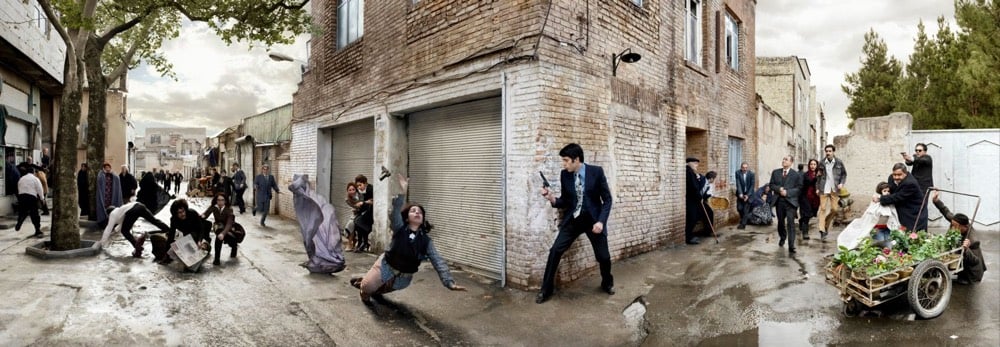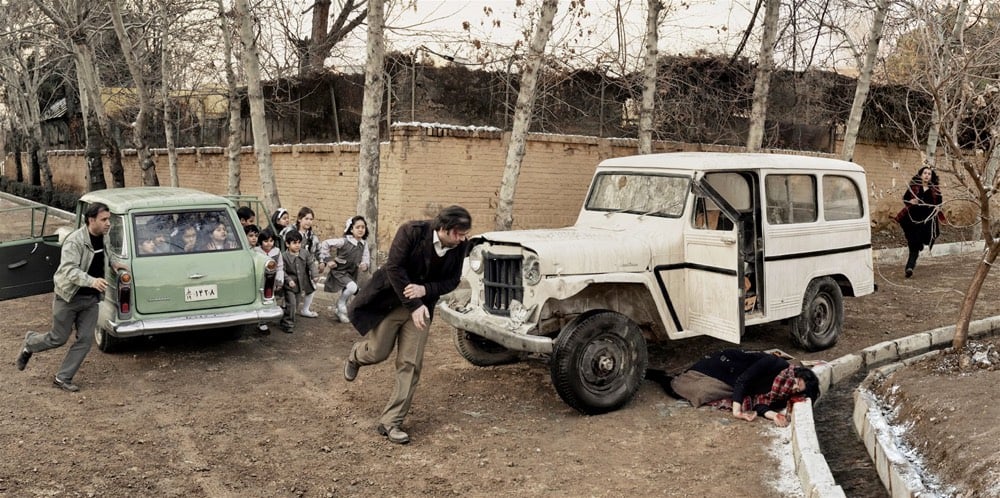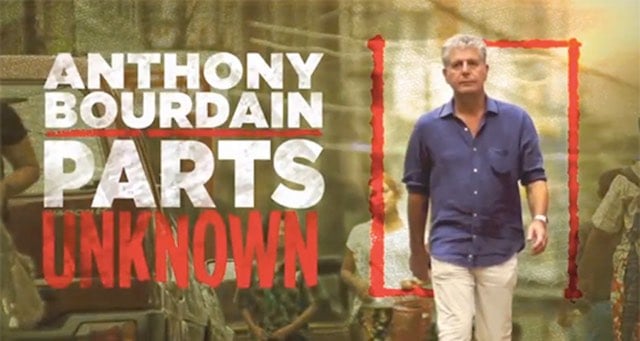(Note: The images below depict simulated violent death.) By An Eye-Witness is an arresting series of images by Azadeh Akhlaghi that recreate seventeen prominent deaths from Iran’s history. According to this interview, Akhlaghi was inspired by post-election uprisings in Iran and Arab Spring to document these deaths.
Eiferman: How was this like shooting a movie?
Akhlaghi: After three years of research by myself, I found a producer and then a crew. We had one month for pre-production and 20 days to shoot all 17 pictures, so we had to be very quick, with only one day to shoot each picture. We had a very low budget so we couldn’t hire actors, and we mostly used friends or extras. But like a movie, I had a professional team with a make-up artist, set designer, assistant director, and everything.
Eiferman: You have a lot of experience in filmmaking; why did you choose to do this series as photographs?
Akhlaghi: I worked as an assistant director for a few years, yes. But I thought staged photography would be closer to the idea of art I had in mind. I was heavily influenced by old paintings but the narrative techniques are borrowed from my old engagement with cinema and literature.





For her photo series Qajar, Iranian photographer Shadi Ghadirian styled her subjects and their backgrounds as they would have appeared in portraits taken during Iran’s Qajar Dynasty in the 19th century. But each subject is also posed with a contemporary object like a boombox, bicycle, soda can, or vacuum cleaner. Ghadirian says of her work: “My pictures became a mirror reflecting how I felt: we are stuck between tradition and modernity.”
In 2008, Hossein Derakhshan was sentenced to 20 years in jail in Iran for blogging and championing the open web. Released and pardoned late last year, Derakhshan is now wondering why the web he went to jail for is dying and why no one is stopping it. Just as things changed in the real world while he was imprisoned:
Around me, I noticed a very different Tehran from the one I’d been used to. An influx of new, shamelessly luxurious condos had replaced the charming little houses I was familiar with. New roads, new highways, hordes of invasive SUVs. Large billboards with advertisements for Swiss-made watches and Korean flat screen TVs. Women in colorful scarves and manteaus, men with dyed hair and beards, and hundreds of charming cafes with hip western music and female staff. They were the kinds of changes that creep up on people; the kind you only really notice once normal life gets taken away from you.
…so too did the web:
The hyperlink was my currency six years ago. Stemming from the idea of the hypertext, the hyperlink provided a diversity and decentralisation that the real world lacked. The hyperlink represented the open, interconnected spirit of the world wide web — a vision that started with its inventor, Tim Berners-Lee. The hyperlink was a way to abandon centralization — all the links, lines and hierarchies - and replace them with something more distributed, a system of nodes and networks.
Blogs gave form to that spirit of decentralization: They were windows into lives you’d rarely know much about; bridges that connected different lives to each other and thereby changed them. Blogs were cafes where people exchanged diverse ideas on any and every topic you could possibly be interested in. They were Tehran’s taxicabs writ large.
Since I got out of jail, though, I’ve realized how much the hyperlink has been devalued, almost made obsolete.
(via @anildash)

I’ve caught a couple of episodes of CNN’s Anthony Bourdain: Parts Unknown and I’ve been impressed with the show so far. In it, chef/author Anthony Bourdain travels to places off the beaten path and explores the local culture. But it’s not just about food and culture as with his previous shows. In Parts Unknown, Bourdain also delves into local politics and social issues. In Iran, he spoke with journalists about their tenuous relationship with the government (and two of the journalists he spoke with were subsequently arrested). Episodes in the Congo, Myanmar, and Libya are produced with a focus on their oppressive governments, past and present. Even in the Massachusetts episode, he talks about his former heroin addiction and the current addiction of poor whites in the US. Many of the places he visits, we only hear about the leadership and bad things that happen on the news, but Bourdain meets with the locals and finds more similarities amongst cultures than differences. I’d never considered going to visit someplace like Iran, but Parts Unknown has me considering it…what a great people.
Season four recently wrapped up and they’re shooting season five now. The first three seasons are currently available on Netflix and all four seasons are on Amazon. (FYI to the web team at CNN: “Unknown” is misspelled in the
of that page.)
</p>
<ul class="post-tags"><li><a href="/tag/Anthony%20Bourdain">Anthony Bourdain</a></li>
<li><a href="/tag/Anthony%20Bourdain%3A%20Parts%20Unknown">Anthony Bourdain: Parts Unknown</a></li>
<li><a href="/tag/food">food</a></li>
<li><a href="/tag/Iran">Iran</a></li>
<li><a href="/tag/travel">travel</a></li>
<li><a href="/tag/TV">TV</a></li>
</ul>
<div class="post-actions">
<a class="share" href="http://also.kottke.org/15/01/anthony-bourdain-parts-unknown"><i class="fa-light fa-share-from-square" aria-hidden="true"></i><span class="action-label">Share</span></a>
</div>
</div>
<hr class="sep">
<div class="post">
<div class="post-meta">
posted <time class="timeago timeago_short" datetime="2009-06-18T20:16:01Z">Jun 18 @ 04:16 PM</time> by <a href="http://www.kottke.org">Jason Kottke</a>
</div>
<h2><a href="/09/06/hey-wsj-where-is-iran">Hey WSJ, where is Iran?</a></h2>
<p><a href="http://blogs.wsj.com/photojournal/">The Wall Street Journal’s Photo Journal blog</a>, the launch of which was inspired by The Big Picture, has posted exactly *zero* photos of what’s going on in Iran right now in their “Pictures of the Day” feature. That strikes me as odd. In contrast, The Big Picture has posted <a href="http://www.boston.com/bigpicture/2009/06/irans_presidential_election.html">three</a> <a href="http://www.boston.com/bigpicture/2009/06/irans_disputed_election.html">big</a> <a href="http://www.boston.com/bigpicture/2009/06/irans_continued_election_turmo.html">entries</a> dedicated to the elections.
</p>
<ul class="post-tags"><li><a href="/tag/2009%20Iranian%20election">2009 Iranian election</a></li>
<li><a href="/tag/Iran">Iran</a></li>
<li><a href="/tag/photography">photography</a></li>
<li><a href="/tag/wsj">wsj</a></li>
</ul>
<div class="post-actions">
<a class="share" href="http://also.kottke.org/09/06/hey-wsj-where-is-iran"><i class="fa-light fa-share-from-square" aria-hidden="true"></i><span class="action-label">Share</span></a>
</div>
</div>
<hr class="sep">
<div class="post">
<div class="post-meta">
posted <time class="timeago timeago_short" datetime="2009-06-18T16:22:36Z">Jun 18 @ 12:22 PM</time> by <a href="http://www.kottke.org">Jason Kottke</a>
</div>
<h2><a href="/09/06/statistical-evidence-of-election-fraud-in-iran">Statistical evidence of election fraud in Iran?</a></h2>
<p>I was kinda waiting for FiveThirtyEight to weigh in on this: <a href="http://www.fivethirtyeight.com/2009/06/karroubis-unlucky-7s.html">using Benford’s Law to check for fraud in the Iranian election results</a> (<a href="http://www.fivethirtyeight.com/2009/06/unconvincing-to-me-use-of-benfords-law.html">here as well</a>).</p>
<blockquote><p>Benford’s law is sometimes useful in these cases, because human beings intuitively tend to distribute the first digits about evenly when they’re making up “random” strings of numbers, when in fact many real-world distributions will be skewed toward the smaller digits.</p></blockquote>
<p>Both 538 pieces are skeptical that <a href="http://en.wikipedia.org/wiki/Benford's_law">Benford’s Law</a> is applicable in this case. (thx, <a href="http://bear-code.com/index.html">nick</a>)</p>
<p><strong>Update:</strong> Voting fraud expert Walter Mebane has <a href="http://www-personal.umich.edu/~wmebane/note18jun2009.pdf">produced a paper on the Iranian election</a> that uses Benford’s Law to check the results. He’s updated the paper several times since it was first published and now writes that “the results give moderately strong support for a diagnosis that the 2009 election was affected by significant fraud”. (thx,scott)</p>
<p><strong>Update:</strong> Done just after the election, <a href="http://tehranbureau.com/2009/06/13/faulty-election-data/">this analysis</a> shows that the returns released by Iran’s Interior Ministry during the course of the day of the election shows an unnaturally high steadiness of voting percentages. (thx, <a href="http://deliciousghost.com/">cliff</a>)</p>
<p><strong>Update:</strong> Regarding the previous link, <a href="http://www.fivethirtyeight.com/2009/06/statistical-evidence-does-not-prove.html">Nate Silver doesn’t think much of that analysis</a>. (thx, <a href="http://deliciousghost.com/">cliff</a>)
</p>
<ul class="post-tags"><li><a href="/tag/2009%20Iranian%20election">2009 Iranian election</a></li>
<li><a href="/tag/benfordslaw">benfordslaw</a></li>
<li><a href="/tag/iran">iran</a></li>
<li><a href="/tag/statistics">statistics</a></li>
</ul>
<div class="post-actions">
<a class="share" href="http://also.kottke.org/09/06/statistical-evidence-of-election-fraud-in-iran"><i class="fa-light fa-share-from-square" aria-hidden="true"></i><span class="action-label">Share</span></a>
</div>
</div>
<hr class="sep">
<div class="post">
<div class="post-meta">
posted <time class="timeago timeago_short" datetime="2007-10-01T01:30:51Z">Sep 30 @ 09:30 PM</time> by <a href="http://www.kottke.org">Jason Kottke</a>
</div>
<h2><a href="/07/09/a-seymour-hersh-piece-from-tomorrows-new">A Seymour Hersh piece from tomorrow’s New</a></h2>
<p><a href="http://www.newyorker.com/reporting/2007/10/08/071008fa_fact_hersh?currentPage=all">A Seymour Hersh piece from tomorrow’s New Yorker about the Bush Administration’s plan for Iran</a>. Amazingly enough, Bush is using the same tactics he did to wage war in Iraq. This time, instead of Iraq = Al-Qaeda, it’s Iran = Iraq.</p>
<blockquote><p>In a series of public statements in recent months, President Bush and members of his Administration have redefined the war in Iraq, to an increasing degree, as a strategic battle between the United States and Iran. “Shia extremists, backed by Iran, are training Iraqis to carry out attacks on our forces and the Iraqi people,” Bush told the national convention of the American Legion in August. “The attacks on our bases and our troops by Iranian-supplied munitions have increased… The Iranian regime must halt these actions. And, until it does, I will take actions necessary to protect our troops.” He then concluded, to applause, “I have authorized our military commanders in Iraq to confront Tehran’s murderous activities.”</p></blockquote>
<p>Will we fall for it again?
</p>
<ul class="post-tags"><li><a href="/tag/alqaeda">alqaeda</a></li>
<li><a href="/tag/George%20W.%20Bush">George W. Bush</a></li>
<li><a href="/tag/iran">iran</a></li>
<li><a href="/tag/Iraq">Iraq</a></li>
<li><a href="/tag/seymourhersh">seymourhersh</a></li>
<li><a href="/tag/usa">usa</a></li>
<li><a href="/tag/war">war</a></li>
</ul>
<div class="post-actions">
<a class="share" href="http://also.kottke.org/07/09/a-seymour-hersh-piece-from-tomorrows-new"><i class="fa-light fa-share-from-square" aria-hidden="true"></i><span class="action-label">Share</span></a>
</div>
</div>
<hr class="sep">
<div class="post">
<div class="post-meta">
posted <time class="timeago timeago_short" datetime="2006-08-16T16:19:37Z">Aug 16 @ 12:19 PM</time> by <a href="http://www.kottke.org">Jason Kottke</a>
</div>
<h2><a href="/06/08/an-article-in-this-weeks-new-yorker">An article in this week’s New Yorker</a></h2>
<p><a href="http://www.newyorker.com/fact/content/articles/060821fa_fact">An article in this week’s New Yorker by Seymour Hersh</a> suggests that the attack of Hezbollah in Lebanon by Israel was premeditated and approved by the US government, who viewed it as a chance to weaken both Hezbollah and Iran and as a template for similar attacks for an upcoming war with Iran.
</p>
<ul class="post-tags"><li><a href="/tag/hezbollah">hezbollah</a></li>
<li><a href="/tag/iran">iran</a></li>
<li><a href="/tag/Israel">Israel</a></li>
<li><a href="/tag/lebanon">lebanon</a></li>
<li><a href="/tag/seymourhersh">seymourhersh</a></li>
<li><a href="/tag/war">war</a></li>
</ul>
<div class="post-actions">
<a class="share" href="http://also.kottke.org/06/08/an-article-in-this-weeks-new-yorker"><i class="fa-light fa-share-from-square" aria-hidden="true"></i><span class="action-label">Share</span></a>
</div>
</div>
<hr class="sep">
<div class="post">
<div class="post-meta">
posted <time class="timeago timeago_short" datetime="2006-01-24T14:00:32Z">Jan 24 @ 09:00 AM</time> by <a href="http://www.kottke.org">Jason Kottke</a>
</div>
<h2><a href="/06/01/hossein-derakhshan-is-on-his-way-to">Hossein Derakhshan is on his way to</a></h2>
<p><a href="http://hoder.com/weblog/archives/014928.shtml">Hossein Derakhshan is on his way to Israel</a>, which is unusual for a native Iranian. “As a citizen journalist, I’m going to show my 20,000 daily Iranian readers what Israel really looks like and how people live there.”
</p>
<ul class="post-tags"><li><a href="/tag/hosseinderakhshan">hosseinderakhshan</a></li>
<li><a href="/tag/iran">iran</a></li>
<li><a href="/tag/Israel">Israel</a></li>
</ul>
<div class="post-actions">
<a class="share" href="http://also.kottke.org/06/01/hossein-derakhshan-is-on-his-way-to"><i class="fa-light fa-share-from-square" aria-hidden="true"></i><span class="action-label">Share</span></a>
</div>
</div>
<hr class="sep">
<div class="post">
<div class="post-meta">
posted <time class="timeago timeago_short" datetime="2005-06-13T12:34:45Z">Jun 13 @ 08:34 AM</time> by <a href="http://www.kottke.org">Jason Kottke</a>
</div>
<h2><a href="/05/06/hossein-derakhshan-founding-father-of-the-influential">Hossein Derakhshan, founding father of the influential</a></h2>
<p><a href="http://hoder.com/weblog/archives/014173.shtml">Hossein Derakhshan, founding father of the influential Iranian blogging movement, is visiting Iran and needs your financial support</a>. He’s going to cover the trip as a citizen journalist but warns that he may be detained, questioned, thrown in jail, be forced to make false statements, etc.
</p>
<ul class="post-tags"><li><a href="/tag/hosseinderakhshan">hosseinderakhshan</a></li>
<li><a href="/tag/iran">iran</a></li>
<li><a href="/tag/journalism">journalism</a></li>
<li><a href="/tag/weblogs">weblogs</a></li>
</ul>
<div class="post-actions">
<a class="share" href="http://also.kottke.org/05/06/hossein-derakhshan-founding-father-of-the-influential"><i class="fa-light fa-share-from-square" aria-hidden="true"></i><span class="action-label">Share</span></a>
</div>
</div>
<hr class="sep">
</div>
<div class="grid-item" id="sp2" aria-hidden="true"></div>
</div></div>
<div id="menu-underlay"></div>
<script>
mediumZoom(document.querySelectorAll(".post img:not(.url-card img)"), {
margin: 10,
background: "rgba(38, 37, 35, 1.0)",
});
</script>
</body>
</html> 










Stay Connected